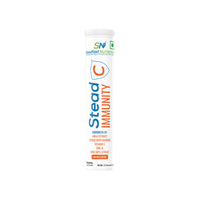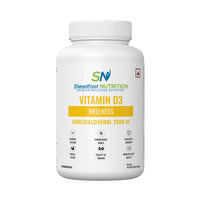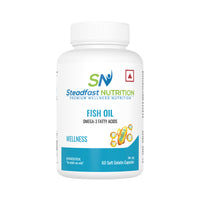Table of Content
From our 9-5 jobs to managing household chores, our schedules are jam-packed and stress levels are high, and maintaining optimal health can be difficult. Even with the best intentions, our diets frequently fall short of meeting all of our nutritional needs. Environmental factors, age, quality of food and persistent stress all drain our bodies' resources.
This is where nutritional supplements come into play. They provide a convenient and effective way to fill nutritional gaps, ensuring that we get the essential vitamins, minerals, and other elements that help our immune system, boost energy, and improve general well-being. By incorporating supplements into our daily routines, we may protect our body’s immunity against the stresses of contemporary life, allowing us to remain vibrant, active, and ready to face whatever comes our way. If your diet lacks these vital nutrients and your immunity is low, don’t fret since we have a ready reference of supplements to boost immunity for you. These supplements are advantageous for the body as they provide multiple nutrient benefits also minimising the risk of deficiencies.
Here are 15 supplements to boost your immune system:
1. Vitamin C:
Vitamin C is widely known for its ability to support the immune system. It acts as a potent antioxidant, protecting cells from free radical damage. This vitamin also promotes collagen formation, which is essential for maintaining healthy skin and promotes the healing process. Furthermore, vitamin C improves the activity of white blood cells, which is essential for fighting infections. It facilitates a variety of cellular processes that contribute to a strong immune response. Regular vitamin C intake, whether through diet or supplementation, can aid in the maintenance of a strong immune system, minimising the duration and severity of common colds and other illnesses.
A 2017 study published at NCBI states that vitamin C appears to have a wide range of positive impacts on cellular activities of both the innate & adaptive immune systems. Vitamin C supports the body’s fight against pathogens and promotes radical scavenging, potentially protecting against oxidative stress. Vitamin C also appears to be useful in preventing and treating respiratory and systemic infections via improved immune cell performance.
If you are looking for a reliable source of vitamin C supplements in the form of a vitamin C tablet, SteadC by Steadfast Nutrition can be your ideal pick.
2. Zinc:
Zinc is needed for a healthy immune system. It is essential for the growth and function of immune cells such as neutrophils and natural killer cells, which serve as the body's initial line of defence against infections. Zinc also has antioxidant capabilities, which protect cells from oxidative stress and damage. It promotes the formation and activation of T lymphocytes, which are essential for adaptive immunity and fighting specific infections. Zinc supplementation can also help reduce inflammation and shorten the duration and intensity of colds. Regular zinc intake, whether through diet or supplementation, is critical for maintaining a strong and effective immune response. Zinc deficiency can decrease immune function, leaving the body more vulnerable to infections. As a result, maintaining proper zinc levels is vital for overall health and immunity.
Zinc supports the body functions, including immune system function, such as faster healing of wounds, improving taste and smell, reducing age-related macular degeneration and certain skin diseases like dermatitis.
A 2017 study published at NCBI states that zinc can be regarded as an immune system gatekeeper, as almost all immune cells rely heavily on zinc for proper function. A zinc supplement is thus one of the best supplements to boost immunity.
3. Curcumin:
Curcumin, turmeric's main active component, has a number of immune-boosting properties. It has potent anti-inflammatory and antioxidant capabilities that help protect the body's cells from damage. Curcumin regulates the activation of numerous immune cells, including T cells, B cells, macrophages, and natural killer cells, improving their ability to respond to infections. Curcumin has also been proven to lower the production of pro-inflammatory cytokines, chemicals that can cause an excessive immune response. This can help with chronic inflammation and autoimmune disorders. Curcumin consumption regularly, whether through turmeric or supplements, can benefit the immune system by maintaining a balanced immunological response and lowering the risk of chronic diseases. It leads to the inhibition of inflammation, preventing certain immune-mediated inflammatory diseases like rheumatoid arthritis, multiple sclerosis & inflammatory bowel disease. It plays a critical role in the management of diseases due to its anti-bacterial, anti-viral, anti-fungi, hepato-protective & anti-tumour other than having anti-inflammatory properties.
4. Vitamin D:
Its deficiency is associated with an increased susceptibility to infections. Vitamin D boosts the pathogen-fighting abilities of monocytes & macrophages - white blood cells which are essential for immunological defence. It reduces inflammation and stimulates the synthesis of antimicrobial peptides, which help the body fight bacterial and viral illnesses. It is a fat-soluble vitamin that helps the body maintain calcium and phosphorus levels through proper absorption. Exposure to sunlight, ingesting vitamin D-rich foods, and taking supplements as needed can all assist in maintaining optimal levels and supporting general immunological function. To battle Vitamin D deficiency, it is recommended to consume a vitamin D capsule by Steadfast Nutrition. It comprises 2000 IU of vitamin D3.
A 2020 study published by the NCBI clearly establishes vitamin D's influence on the immune system is that preventing severe vitamin D deficiency enhances immunological health and reduces vulnerability to autoimmune illnesses.
5. Vitamin B Complex:
The vitamin B complex, which includes B1 (thiamine), B2 (riboflavin), B3 (niacin), B5 (pantothenic acid), B6 (pyridoxine), B7 (biotin), B9 (folate), and B12 (cobalamin), is essential for a healthy immune system. Each B vitamin has a distinct role in immune support, ranging from immune cell energy production to inflammation reduction and antioxidant protection. B vitamins help maintain the health of the skin and mucous membranes, which act as barriers against infections and are required for the formation and function of white blood cells, lymphocytes, and antibodies. Vitamins B6, B9, and B12 are very necessary for the formation of new red blood cells and transporting oxygen, helping improve the body's ability to combat infections and maintain overall immune health.
A 2022 research paper published at NCBI states riboflavin's active forms are antioxidants, which are essential for cellular respiration and immunological function.
Moreover, pyridoxal 5′-phosphate, the active form, helps several enzymes accomplish a variety of body functions, including maintaining appropriate homocysteine levels and supporting immunological function and brain health.
6. Spirulina:
Spirulina, a blue-green algae, or chlorophyll-containing bacteria is well known for its immune-boosting effects. It contains proteins, vitamins, minerals, and antioxidants that promote general health. Spirulina boosts the immune system by raising antibody production and the activity of natural killer cells and macrophages, all of which are required to fight infections. Its high antioxidant concentration helps immune cells resist oxidative damage. The presence of vitamins E, C, and B6 helps boost the production of WBCs, reduce chronic inflammation and promote a healthy immunological response. Regular spirulina use, whether as a supplement or as part of a healthy diet, can help boost the immune system and increase the body's ability to fight infections.
In a research study conducted by NCBI in 2022, it was found that spirulina can prevent immune cell changes while strengthening eosinophils and basophils. As a result, the spirulina supplement helped to stabilise the leukocyte-monocyte-eosinophil-basophil ratio. Spirulina also has a good effect on rapid-onset allergies and responses to parasites or pathogenic bacteria, which helps improve immunological control.
7. Shilajit:
Shilajit, a naturally occurring mineral found largely in the Himalayas, is known for its numerous health advantages, including supporting the immune system supporting and accelerating the process of rejuvenation. Shilajit, which is high in fulvic acid, vitamins & minerals, boosts the immune system by increasing the production of lymphocytes and macrophages, both of which are essential for fighting infections. Shilajit contains fulvic acid, which improves immunological function. Its antioxidant capabilities assist in protecting immune cells from oxidative stress and damage, scavenging free radicals, whilst its anti-inflammatory characteristics reduce chronic inflammation, promoting a healthy immunological response. Shilajit taken on a regular basis can help strengthen the immune system and boost energy levels.
8. Ginseng:
Ginseng, specifically Asian ginseng (Panax ginseng) and American ginseng (Panax quinquefolius), is well-known for its immune-boosting qualities. It contains active molecules called ginsenosides, which have antioxidant and anti-inflammatory properties that benefit immune health. Ginsenosides help regulate immune homeostasis and have been shown to boost the function of immune cells such as macrophages and natural killer cells, which are important for detecting and eradicating infections.
9. Selenium:
Selenium is a vital mineral that promotes immune function and general health. It serves as an antioxidant, protecting cells from free radical damage. Selenium is also essential for the effective functioning of the immune system since it promotes the activity of numerous immune cells, including the T cells and natural killer cells, and helps boost the production of white blood cells which are essential for fighting infections and malignant cells.
According to research, selenium deficiency can impair immunological responses, rendering people more susceptible to infections. Adequate selenium levels improve immune defence mechanisms. Selenium is frequently found in nuts, seeds, seafood and lean meats. Supplementation may be required by those with a deficiency to maintain adequate immunological function.
10. Vitamin A:
Vitamin A is necessary for a robust and healthy immune system. It is essential for a variety of immunological processes, including immune cell growth and differentiation (T cells, B cells, and macrophages). Vitamin A is involved in immune system development, playing regulatory roles in cellular immune responses and humoral immune processes. Furthermore, vitamin A contributes to the integrity of epithelial barriers, such as the skin and intestinal membranes, which serve as the body's first line of defence against infections.
A 2022 study published by ScienceDirect states that recent multidisciplinary investigations have helped to better understand the interaction between vitamin A and the immune system. Dietary retinol in the form of retinoic acid usually influences mucosal immunity and immune tolerance. Carotenoids, the precursor of vitamin A, show an immuno-modulatory effect on the system.
11. Omega 3:
Omega-3 fatty acids, notably EPA (eicosapentaenoic acid) and DHA (docosahexaenoic acid), have an inhibitory effect on immune cells, preventing infections, which is beneficial for the immune system and overall health. These necessary fatty acids are most commonly found in fatty fish such as salmon, mackerel, and sardines, as well as flaxseeds, chia seeds, and walnuts.
Omega-3 fatty acids are anti-inflammatory, which can help modulate immunological responses of B & T- Lymphocytes. They regulate the generation of inflammatory mediators and have the potential to reduce chronic inflammation, which has been connected to a variety of diseases and ailments. Omega-3s promote a healthy immune response by controlling inflammation, allowing the body to defend itself against infections and preserve optimal health. To get the benefits of Omega-3, fish oil supplements are often advised by health practitioners. If you are looking to find the best fish oil supplement, Steadfast Nutrition’s Fish Oil can be your ideal pick.
Several studies by NCBI have established omega-3 fatty acids modulate several inflammatory pathways like inhibition of leukocytes, inhibition of pro-inflammatory cytokines, increased production of inflammation-resolving resolvins, maresins, lipoxins, and protectins, and activation of G protein-coupled receptor GPR120.
12. Protein:
While protein supplements can be useful for people who struggle to reach their protein requirements through diet alone, it's critical to understand their role in immunological health. Protein is crucial for immune function because it is involved in the creation and function of immune cells, antibodies, and enzymes that aid in immunological responses. Antibodies or immunoglobulins are proteins produced by the immune system in response to foreign micro-organisms. Adequate protein intake promotes the growth and function of white blood cells, which are essential components of the immune system's defence against illnesses.
Amino acids help regulate and modulate immune response. Whey proteins also contain immunoglobulins that have immune-enhancing bioactivity. Protein supplements, including trustworthy quality whey protein from India’s fastest-growing premium sports nutrition and wellness brand, can be a great thing. They contain important amino acids required to develop and repair tissues, including immune cells.
13 Probiotics:
Probiotics, or live beneficial bacteria, play an important role in immune system health. These microorganisms are primarily found in the gut, where they contribute to the maintenance of healthy intestinal flora, which is critical for appropriate immune function because the gut contains a major proportion of the body's immune cells. Probiotics improve immune health by modifying immunological responses, increasing immune cell production such as macrophages and T cells, and strengthening the gut barrier function, which prevents dangerous pathogens from entering the bloodstream. They also create antimicrobial compounds that restrict the growth of dangerous germs and regulate inflammation, mitigating the deleterious effects of prolonged inflammation. Probiotics exert different immune-regulatory effects like gene expression, protein synthesis, and intestinal epithelial cells.
In a study published at NCBI in 2023, it was found that broad evidence indicates that intestinal immune cells interact with consumed probiotics, and this interaction can improve host immune homeostasis and immune function.
14. Aloe Vera:
Aloe vera, a succulent plant with therapeutic characteristics, has a variety of immune-system effects. It contains bioactive elements such as vitamins, enzymes, amino acids, and antioxidants, which help boost immunological function. Aloe vera's anti-inflammatory effects prevent chronic inflammation, which can impair the immune system, and its antioxidants protect immune cells from free radical damage.
Aloe vera also promotes the formation and activity of white blood cells, which are necessary for infection detection and elimination. It also contains antibacterial qualities that can help prevent bacterial, viral, and fungal infections. Aloe vera's polysaccharides, particularly acemannan, encourage the synthesis of cytokines, which are chemicals that help regulate immunological responses. Studies show aloe vera functions as an antioxidant to scavenge free radicals.
15. Ginger Extract:
Ginger extract, obtained from the root of the ginger plant (Zingiber officinale), is well-known for its powerful therapeutic effects, particularly in immune support. Ginger extract, which contains bioactive components including gingerols and shogaols, has powerful anti-inflammatory and antioxidant properties that help protect immune cells from injury and prevent chronic inflammation.
Ginger has antibacterial qualities that help defend against bacterial infections. It boosts the creation of white blood cells, which improves the body's ability to fight off infections. Due to its anti-inflammatory properties, conditions like respiratory ailments & inflammation can also be reduced by ginger extract.
In a nutshell, the pressures of modern life might make it difficult to receive all of the nutrients our body requires to survive. Environmental influences, processed foods, and stress can deplete our nutritional stores, making us more vulnerable to health problems. Incorporating dietary supplements into our regular routine is a practical way to bridge nutritional gaps. Supplements can help to strengthen our immune system, boost our energy levels, and improve our general well-being by ensuring we get enough vitamins, minerals, and other nutrients.
Frequently Asked Questions
Which is the most powerful immune system booster?
A diet rich in all nutrients may prove to be a powerful way to boost immunity but there is no one particular immune booster. A healthy way to boost your immunity is a combination of a balanced diet, regular exercise, proper sleep, and managing stress.
Are there any immune supplements that genuinely work?
Yes, some immune supplements may work wonders, bridging the gaps of nutritional deficiencies. Supplements such as vitamin C, vitamin D, and zinc can help with immune function. However, they perform best when accompanied by a healthy lifestyle.
What should I consume to enhance my immune system?
To support your immune system, consuming certain nutrient-rich foods may help. These include citrus fruits, turmeric, garlic, tulsi, nuts & seeds, probiotics, berries, and cruciferous vegetables.
How can I know if my immune system is weakened?
Recurrent infections, delayed wound healing, constant lethargy, digestive difficulties, and frequent colds and coughs are all signs of a weakened immune system. If you are concerned about low immunity, consult with a healthcare professional.
Can vitamin D assist with Covid-19?
Vitamin D may aid with supporting immunity, but it is not a therapy for Covid-19. Maintaining proper vitamin D through supplements may support immunity, but always seek medical guidance for Covid-19 therapy.






